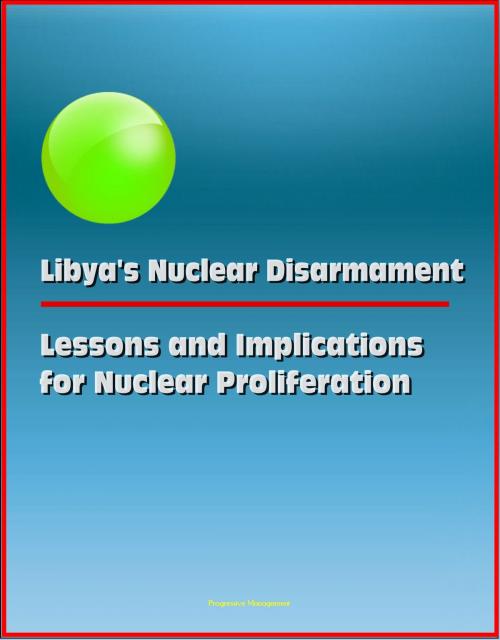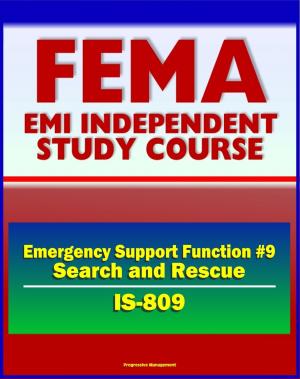Libya's Nuclear Disarmament: Lessons and Implications for Nuclear Proliferation
Nonfiction, Social & Cultural Studies, Political Science| Author: | Progressive Management | ISBN: | 9781301871933 |
| Publisher: | Progressive Management | Publication: | January 8, 2013 |
| Imprint: | Smashwords Edition | Language: | English |
| Author: | Progressive Management |
| ISBN: | 9781301871933 |
| Publisher: | Progressive Management |
| Publication: | January 8, 2013 |
| Imprint: | Smashwords Edition |
| Language: | English |
Recent events in Libya have already had a significant effect on the region and beyond, and perhaps one of the most compelling results has been the potential impact on regional powers for the future course of nuclear proliferation. Libya's nuclear disarmament experience has provided lessons learned for those states who have themselves acquired nuclear weapons recently, may be in the process of developing that capability, or may be considering the possibility of doing so. This study argues that the lessons learned from the Libyan case of disarmament will confirm the decision of those countries that have already acquired nuclear weapons and add momentum to the efforts of those countries on their way to developing or considering the acquisition of nuclear weapons as a means of enhancing national and regime security. This dynamic, not surprisingly, will thereby complicate future efforts at nonproliferation and denuclearization. In light of the impact of the Libyan experience on other countries, the author offers several recommendations as the international community pursues nonproliferation and counterproliferation policies, including paying sufficient attention to both material and symbolic rewards to cooperative countries, placing less emphasis on public calls for regime change, and modifying the regional threat environment.
As part of its mission to broaden U.S. Marine Corps access to information and analysis through publishing, Middle East Studies at Marine Corps University (MES) has established different mechanisms to disseminate relevant publications, including a Monograph Series. The aim of the MES Monograph Series is to publish original research papers on a wide variety of subjects pertaining to the greater Middle East, to include the countries of the Arab world, Israel, Turkey, Iran, Afghanistan, Pakistan and India. The focus of the Monograph Series is on timely subjects with strategic relevance to current and future concerns of the U.S. Professional Military Education community.
In the second issue of the MES Monograph Series, it is argued that the lessons learned from the aftermath of the Libyan nuclear disarmament case will support the position of those countries that already have acquired nuclear weapons and add momentum to the efforts of those countries on their way to developing or considering the acquisition of nuclear weapons as a means of enhancing national and regime security.
Recent events in Libya have already had a significant effect on the region and beyond, and perhaps one of the most compelling results has been the potential impact on regional powers for the future course of nuclear proliferation. Libya's nuclear disarmament experience has provided lessons learned for those states who have themselves acquired nuclear weapons recently, may be in the process of developing that capability, or may be considering the possibility of doing so. This study argues that the lessons learned from the Libyan case of disarmament will confirm the decision of those countries that have already acquired nuclear weapons and add momentum to the efforts of those countries on their way to developing or considering the acquisition of nuclear weapons as a means of enhancing national and regime security. This dynamic, not surprisingly, will thereby complicate future efforts at nonproliferation and denuclearization. In light of the impact of the Libyan experience on other countries, the author offers several recommendations as the international community pursues nonproliferation and counterproliferation policies, including paying sufficient attention to both material and symbolic rewards to cooperative countries, placing less emphasis on public calls for regime change, and modifying the regional threat environment.
As part of its mission to broaden U.S. Marine Corps access to information and analysis through publishing, Middle East Studies at Marine Corps University (MES) has established different mechanisms to disseminate relevant publications, including a Monograph Series. The aim of the MES Monograph Series is to publish original research papers on a wide variety of subjects pertaining to the greater Middle East, to include the countries of the Arab world, Israel, Turkey, Iran, Afghanistan, Pakistan and India. The focus of the Monograph Series is on timely subjects with strategic relevance to current and future concerns of the U.S. Professional Military Education community.
In the second issue of the MES Monograph Series, it is argued that the lessons learned from the aftermath of the Libyan nuclear disarmament case will support the position of those countries that already have acquired nuclear weapons and add momentum to the efforts of those countries on their way to developing or considering the acquisition of nuclear weapons as a means of enhancing national and regime security.















